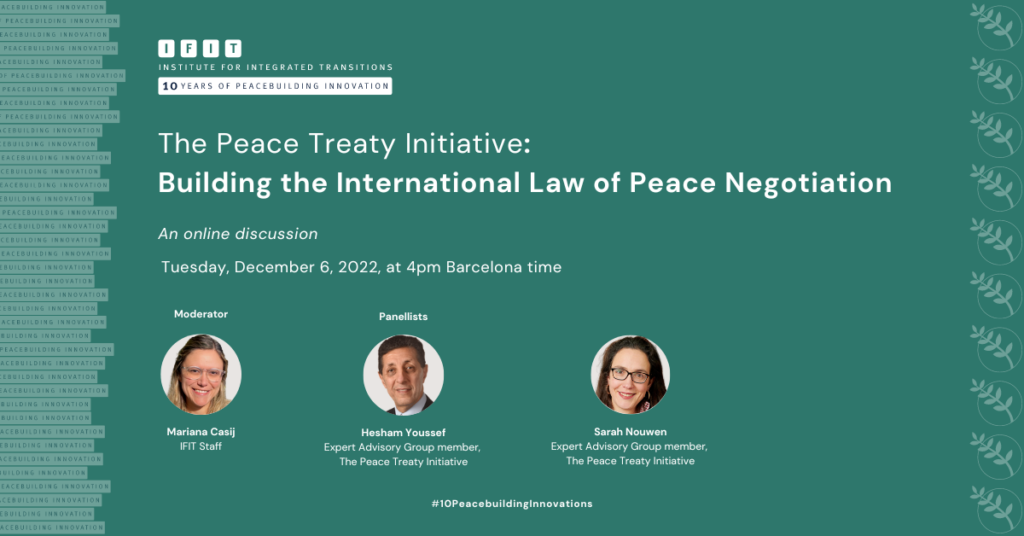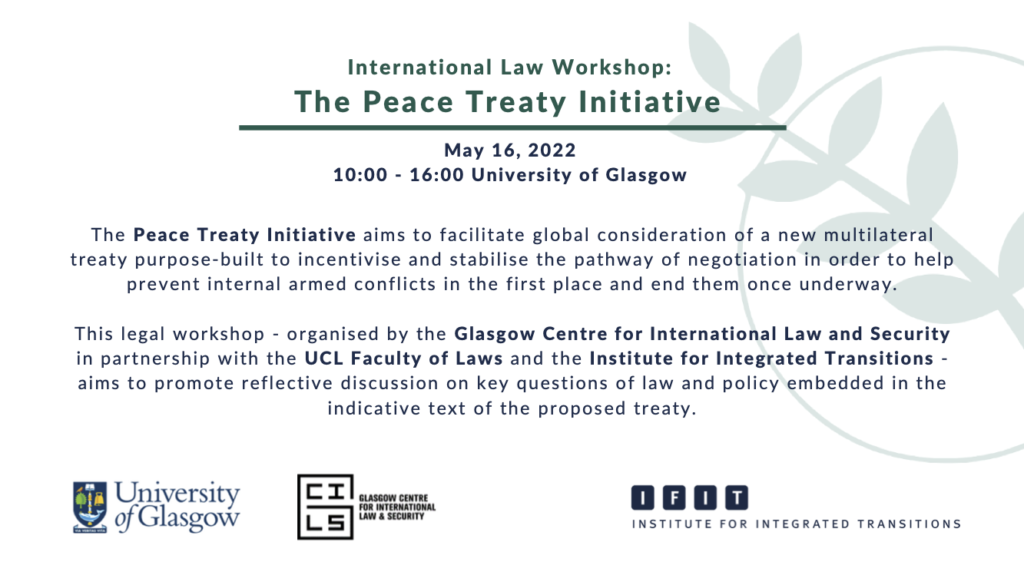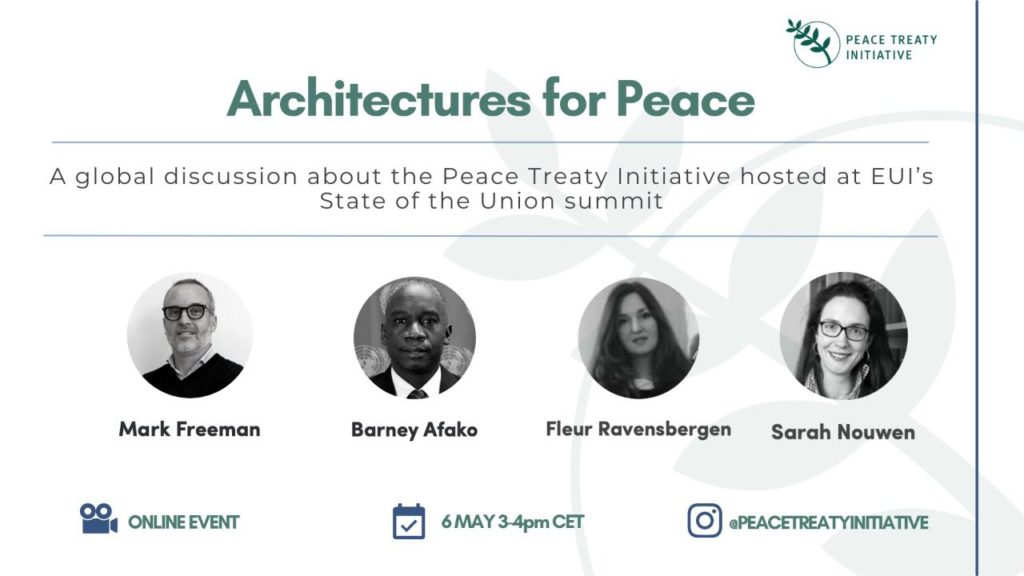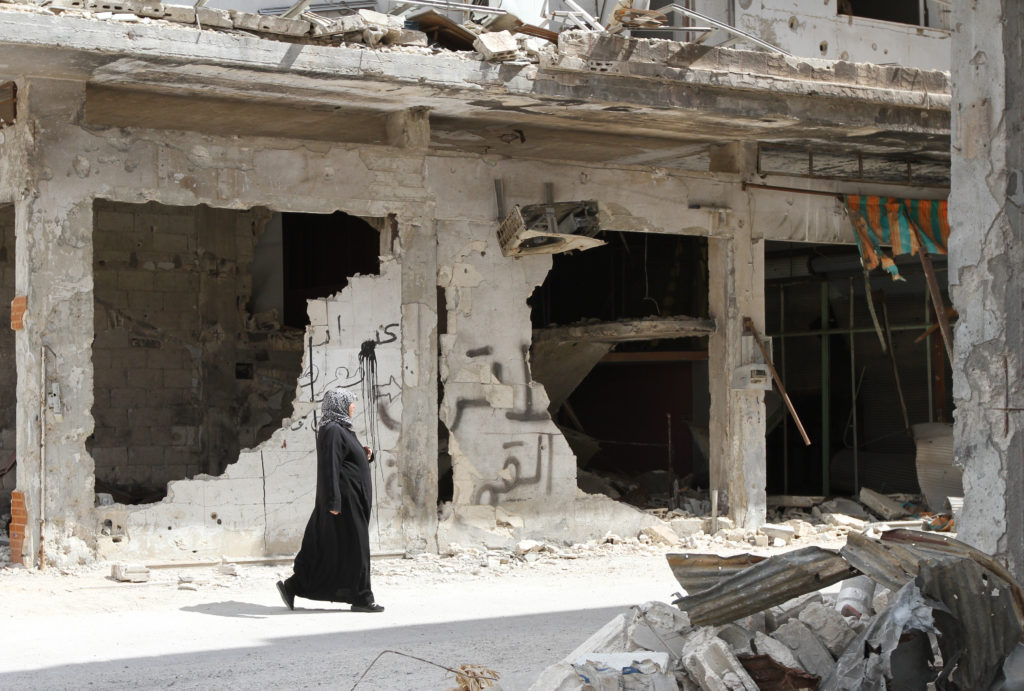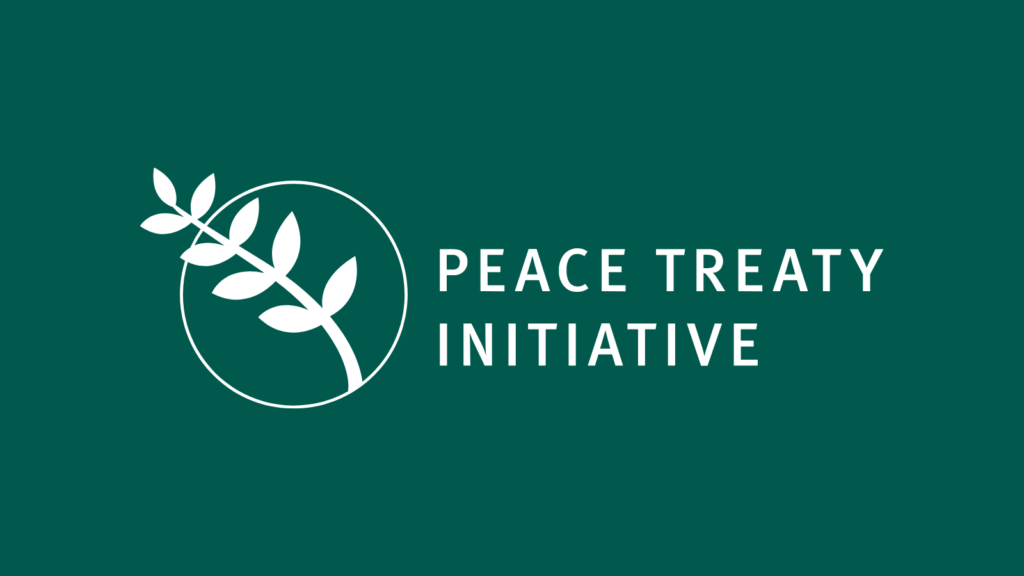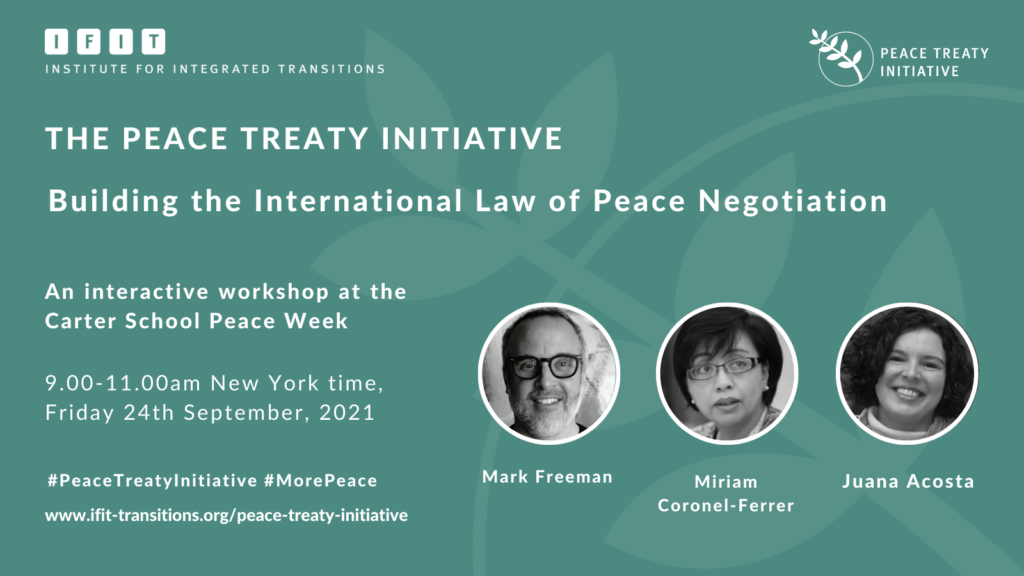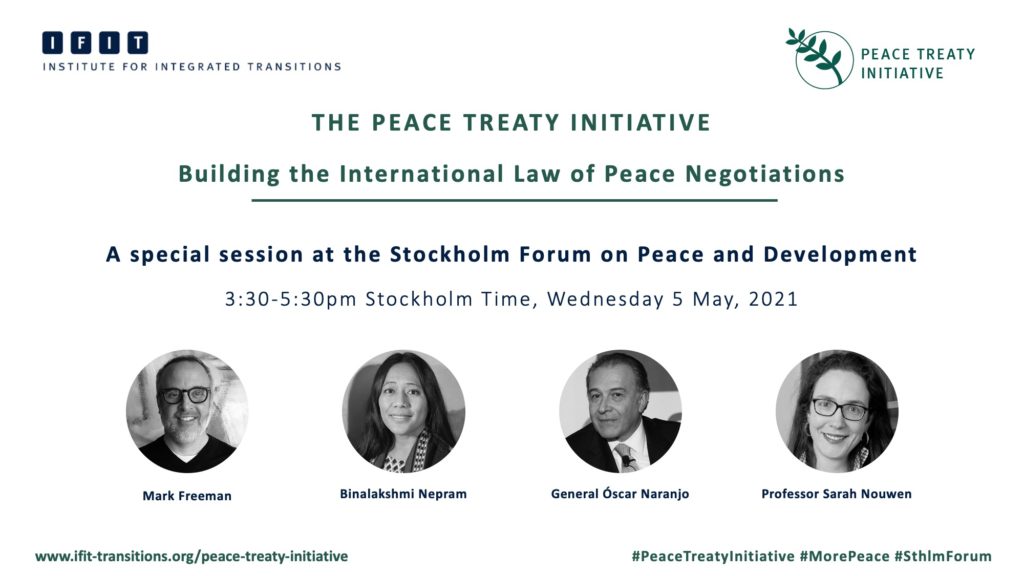
IFIT / WELCOME TO THE PEACE TREATY INITIATIVE
The Peace Treaty Initiative
The Peace Treaty Initiative is a major global undertaking to help develop an international law of peace negotiation. Filling a critical gap in the existing laws of war – which mainly regulate how to fight – the Peace Treaty Initiative aims to facilitate global consideration of a purpose-built multilateral treaty to help incentivise warring parties to choose the pathway of negotiation, in order to prevent armed conflicts in the first place and to end them once underway. Follow the Peace Treaty Initiative on Instagram at @PeaceTreatyInitiative
Scroll down for more
The initiative builds on three years of legal research, diplomatic and expert interviews, and meetings hosted by IFIT and its global partners. This culminated in an initial “indicative text” of the proposed treaty, which was meant to offer a practical starting point for a deliberately inclusive global consultation process launched in April 2021.
During this process, UN member states, as well as leading multilateral organisations, universities, faith-based entities, negotiators, law firms, think tanks and NGOs from around the world had the opportunity to comment on the indicative text through their participation in more than 100 high-level regional and thematic consultation events. The input from the events led to the development of the Draft Articles for the Convention on Conflict Prevention and Resolution, which will be the subject of the next phase of the global consultation process.
FAQ
What does international law currently say about peace negotiations?
- Almost nothing. Article 33(1) of the UN Charter provides that “The parties to any dispute, the continuance of which is likely to endanger the maintenance of international peace and security, shall, first of all, seek a solution by negotiation, enquiry, mediation, conciliation, arbitration, judicial settlement, resort to regional agencies or arrangements, or other peaceful means of their own choice.” However, there is no body of international law that offers legal incentives or an organised framework to make the choice of peace negotiation more attractive at the start, more flexible and organised in the middle, and more stable at the end.
Can this legal gap be filled with voluntary principles and guidelines?
- Voluntary principles and guidelines can be helpful for practitioners, but a legal gap can only be filled – and legal incentives and guarantees can only be created – through a legal instrument.
Why would states want to sign a treaty on peace negotiations?
- Conflicts are exerting a heavy toll on states and their citizens, who would welcome a treaty making it easier to end wars. That said, the eventual content of the treaty will determine the level of state interest. States sign up to multilateral treaties when the benefits of doing so are greater than the burdens.
Is there a draft of what the treaty would look like?
- Yes. The Draft Articles for the Convention on Conflict Prevention and Resolution are currently the subject of the second phase of the global consultation process (see below).
Could the treaty lead to a situation in which negotiation is imposed on an unwilling state?
- No. While the existence of the treaty would increase the attractiveness and stability of peace negotiations, a state party would retain control over which situations it wants to have handled under the treaty.
Could the treaty risk reducing the flexibility or confidentiality that negotiating parties require?
- No. One of the central aims of the proposed treaty is to increase the flexibility and control that negotiating parties have over the process – while simultaneously making available to them new support mechanisms and a clear system for the validation of their key choices.
Would the proposed treaty restrict what can be agreed between the negotiating parties?
- No. The parties would control all the decisions. At the same time, the treaty could offer substantive benefits that are unavailable today. For example, as reflected in the Draft Articles, a “presumption of conformity” with international law could be conferred upon agreements that reflect certain minimum criteria. This would increase international respect for the agreement.
Would the treaty alter or improve the legal status of non-state armed groups?
- No. The Draft Articles make it more attractive for non-state armed groups to make the choice to negotiate, but excludes any change in their legal status by virtue of that choice.
Does the treaty restrict the use of force by states?
- No. The Draft Articles envisage that the existing international legal rights and obligations of states over the timing and manner of the use of force would remain unchanged.
Can I see the Draft Articles for the “Convention on Conflict Prevention and Resolution?”
- Yes. You can access them here. The Draft Articles will continue to be developed in response to consultations and will be discussed at future regional and thematic workshops and events organised in partnership with leading multilateral, academic, legal and nonprofit institutions across the globe.
Who supports this initiative?
- IFIT is facilitating the global consultation process and is supported by a high-level Expert Advisory Group. More generally, the initiative is supported by IFIT’s donor partners and global experts, including members of the Law and Peace Practice Group. Partnerships with prestigious institutions around the globe have also been vital. Currently a purpose-built strategic alliance is being created in order to bring the treaty to fruition.
How can I or my institution get involved?
- You can sign up for our treaty newsletter and follow our Instagram account @peacetreatyinitiative, where upcoming consultation events are announced. In addition, if your institution would like to propose an active form of engagement or support, you can send a one-paragraph proposal to [email protected].
Expert Advisory Group

Patrícia Galvão Teles

Sarah Nouwen

Sienho Yee

Soliman M. Santos, Jr.

Solomon Dersso

Speciosa Wandira-Kazibwe
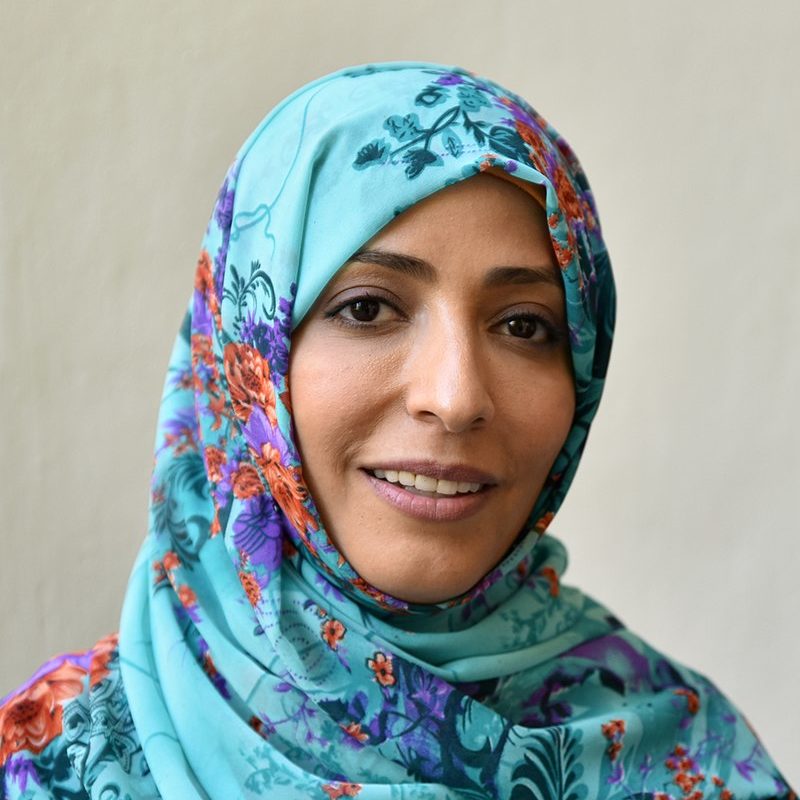
Tawakkol Karman

Véronique Dudouet

Betty Bigombe

Binalakshmi Nepram

Dag Halvor Nylander

Daman Nath Dhungana

Diego García-Sayán

Ekaterina Stepanova

General Oscar Naranjo

Hesham Youssef

Hyeran Jo

Issaka Souaré

Kathryne Bomberger

Mahnoush Arsanjani

Miriam Coronel-Ferrer

Monica McWilliams


Donate
Please help us to make our world a better, safer place, by pledging your support to IFIT and this transformative global effort.



